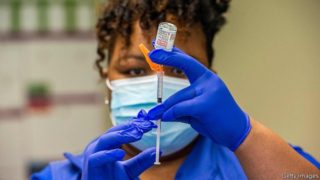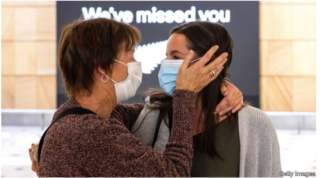Whether a vaccine stops a person from becoming infectious or just keeps them out of hospital depends on how it primes the immune system
THE MILLIONS of covid-19 jabs going into people’s arms every day offer the best hope of an end to the pandemic. But the nature of the benefits they confer is still unclear. Will the vaccines merely prevent people from falling ill or will they also halt the spread of the virus? The question is not as simple as it might seem. Answering it depends upon understanding the battle that takes place between a virus and the human body.
Once a virus enters the body, it hijacks the machinery inside cells and forces them to begin producing new viruses. When a cell is rammed full of viruses it explodes and releases new virions to infect other cells. In people who have contracted covid-19 for the first time, their bodies face a serious challenge. Their immune system must detect the viruses that cause the disease, interpret their presence as dangerous, and develop and deploy the countermeasures that can eliminate them. The body faces a race against time to get viral replication under control before the disease overwhelms its vital functions. Moreover, the more of the virus there is in the body the more likely it is to spread to other people in the breath.
Vaccines defend against SARS-CoV-2 (the virus that causes covid-19) by providing the immune system with the vital information that it needs to begin developing appropriate countermeasures without an actual invasion taking place. One defence is the priming of immunoglobulin A antibodies. These are somewhat like bear traps that have been set by the immune system to snap shut when they encounter SARS-CoV-2. They are placed strategically around entry points like the eyes, nose and mouth. The other major defence involves cytotoxic T-cells. These are hunters. They travel to the lymph nodes and receive instructions compiled during exposure to past infections and vaccines on how to identify infected cells so they can find and destroy them before they allow the virus to replicate. The speed with which these defences eliminate the virus determines whether someone starts to feel unwell and how infectious they become.
If there are millions of antibodies waiting to destroy any SARS-CoV-2 that approaches, the virus cannot get a foothold. The race is quickly won. The host does not feel unwell and is very unlikely to become infectious. Unfortunately, for reasons that immunologists do not understand, antibodies are not always created in large enough numbers in response to vaccines and, even when they are, they sometimes miss their targets. They can also dwindle over time. When this happens, the body relies on the cytotoxic T-cells. In vaccinated individuals, these hunters know exactly what they are looking for from the moment they are deployed. But finding and containing the infection still takes some time and this can allow the virus to replicate enough to make someone mildly infectious. In unvaccinated individuals the situation is a lot worse, as the immune system needs to learn what the invader looks like before the cytotoxic T-cells can be deployed. This provides the virus with the time to replicate and potentially for a person to become highly infectious.
Whether will the current vaccines halt the spread of the virus will depend greatly upon whether they induce people to produce a robust antibody response and, if they do not, the speed of the T-cell response. If the cytotoxic T-cells rapidly suppress infections that take hold in the upper respiratory tract, they will make a person less infectious than they would have otherwise been, while keeping them out of hospital. The early evidence is encouraging, but inconclusive. However, if transmission is substantially reduced it would go a long way towards turning the tide on the pandemic.
By The Economist





